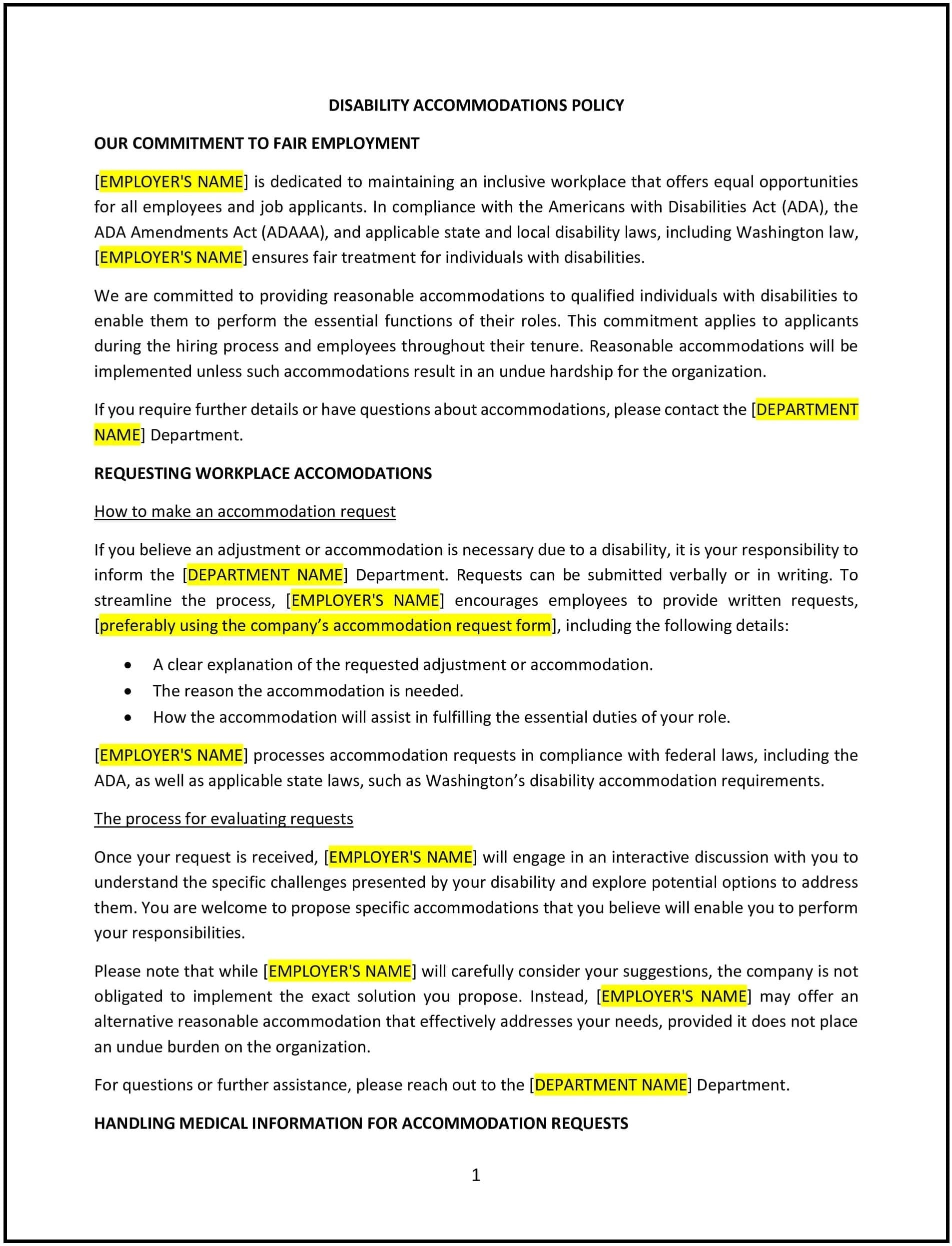Disability accommodations policy (Washington): Free template
Got contracts to review? While you're here for policies, let Cobrief make contract review effortless—start your free review now.

Customize this template for free
This disability accommodations policy is designed to help Washington businesses provide reasonable accommodations for employees with disabilities, ensuring they have the necessary support to perform their job duties effectively. The policy outlines the process for requesting accommodations, how the company evaluates requests, and the steps taken to ensure that employees with disabilities are treated fairly and have equal access to job opportunities and resources.
By adopting this policy, businesses can promote inclusivity, support employees with disabilities, and comply with Washington state and federal disability laws, including the Americans with Disabilities Act (ADA) and the Washington Law Against Discrimination (WLAD).
How to use this disability accommodations policy (Washington)
- Define disability and reasonable accommodation: Clearly define what constitutes a disability under the policy, as well as what qualifies as a reasonable accommodation. The policy should clarify that reasonable accommodations may include changes to work schedules, physical modifications to the workplace, or adjustments in how job tasks are performed.
- Establish the process for requesting accommodations: The policy should outline the procedure for employees to request accommodations, including how to submit requests, the types of documentation that may be required, and the timeline for providing accommodations.
- Designate a responsible party: Identify the individual or team responsible for evaluating accommodation requests, such as the HR department or a designated disability coordinator. This person or team should be knowledgeable about disability laws and best practices for implementing accommodations.
- Assess each request individually: The policy should emphasize that each accommodation request will be evaluated on a case-by-case basis, considering the specific needs of the employee, the nature of the job, and the company’s resources. The company should be flexible and open to reasonable adjustments to support employees with disabilities.
- Ensure confidentiality: The policy should ensure that all information related to accommodation requests is kept confidential, including medical documentation or any personal information shared by the employee. It should clarify that only those who need to know will be informed about the accommodation.
- Address temporary and long-term accommodations: Specify whether temporary accommodations will be provided in the case of short-term disabilities or injuries, as well as how long-term accommodations will be implemented for employees with permanent disabilities.
- Monitor and adjust accommodations: The policy should include provisions for monitoring the effectiveness of accommodations once they are in place. If an accommodation is not effective or needs modification, the company should work with the employee to adjust it as needed.
- Promote compliance with Washington and federal laws: The policy should comply with Washington state disability laws, federal regulations like the ADA, and industry standards. It should include a commitment to providing reasonable accommodations to employees with disabilities to the extent required by law.
- Review and update regularly: Periodically review and update the policy to ensure it remains compliant with Washington state laws, federal regulations, and any changes in the company’s operations or employee needs.
Benefits of using this disability accommodations policy (Washington)
This policy offers several benefits for Washington businesses:
- Promotes inclusivity and diversity: By providing reasonable accommodations for employees with disabilities, businesses promote an inclusive workplace where all employees have an equal opportunity to succeed.
- Reduces legal risks: The policy helps businesses comply with Washington state and federal disability laws, reducing the risk of legal disputes, complaints, or lawsuits related to disability discrimination.
- Enhances employee satisfaction and retention: Providing accommodations demonstrates the company’s commitment to supporting its employees, which can increase job satisfaction, loyalty, and retention, especially among employees with disabilities.
- Increases productivity: When employees receive the accommodations they need, they are better able to perform their job tasks and contribute to the company’s success, improving overall productivity.
- Protects the company’s reputation: A company that is known for supporting employees with disabilities and promoting equal access to opportunities is seen as a responsible, ethical employer, which enhances its reputation in the community and the industry.
- Improves workplace morale: A workplace that values inclusivity and ensures that employees with disabilities are supported fosters a positive work culture and improves employee morale across the organization.
Tips for using this disability accommodations policy (Washington)
- Communicate the policy clearly: Ensure that all employees are aware of the disability accommodations policy and understand how to request accommodations. Include the policy in the employee handbook and review it during onboarding and regular employee training.
- Train managers and HR personnel: Provide training for managers and HR personnel on how to handle accommodation requests, assess employees’ needs, and implement appropriate accommodations. This ensures that all team members are equipped to support employees with disabilities.
- Keep the process flexible: Accommodations should be customized to the employee’s needs. The policy should encourage flexibility in finding solutions that work for both the employee and the business, while maintaining productivity and efficiency.
- Respect privacy: Ensure that employees’ medical information or details about their disability are kept confidential, with only those involved in the accommodation process having access to the information.
- Regularly evaluate accommodations: After accommodations are made, monitor their effectiveness and make adjustments as necessary. This will ensure that the accommodation is truly meeting the employee’s needs and enabling them to perform their job tasks effectively.
- Review and update regularly: Periodically review the policy to ensure it remains compliant with Washington state laws, federal regulations, and any changes in the company’s operations or the needs of employees with disabilities. Regular updates will help ensure the policy stays effective and relevant.